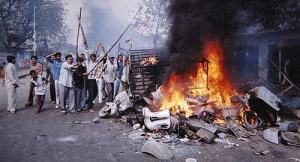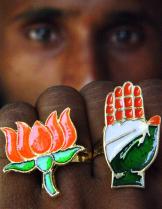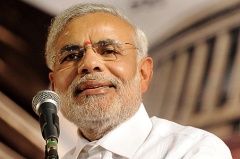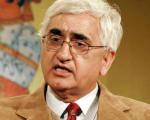Modi vs the Congress: The War of Words
October 18, 2012 Leave a comment
Ayushman Jamwal
Shock rhetoric is an innate attribute of the beast of politics. In campaigns under the 24 hour media scanner, they do a great deal to bolster and damage the credibility of people and organizations. Be it individual ideologies, the impression of failure, immorality or sympathy, hit the right buttons at the right time and rhetoric can become a potent political tool. While no political statement ever gets old for political hawks, public engagement on the other hand dwindles over time unless the argument is replenished with facts.
Take the example of the Presidential elections in the United States right now. Dubbed the ‘economic elections’, I think Mitt Romney is the worst candidate to usher the Republican party into the White House as his image is open to damaging shock rhetoric by the Obama camp. Not only is Romney a staunch conservative against the now commonly accepted ideas of gun control, gay marriage and family planning, he is a businessman whose record is now out in the open. Like all businessmen, his profit seeking policies at Bain Capital slashed jobs and shipped employment overseas. In the presidential race, that aspect of his past has become the signature attack of the Obama campaign. Even though the President was seemingly bested in the first election debate, he is beating the Bain Capital drums loud enough, creating a huge PR nightmare for Romney.
 Crossing over to India, the same can be seen with the image of the Congress party. Its image has been significantly marred by corruption allegations and scandals like the Commonwealth Games, the 2G scam, Coalgate and most recently the alleged Robert Vadra-DLF nexus, along with reports highlighting the general breakdown of governance in almost all areas of administration from healthcare to law and order. With the constant re-emergence of cases and issues, the Opposition’s shock rhetoric continues to hold weight. The effect can clearly be seen in the clout held by numerous Opposition protests and more significantly in a majority of elections across the country where an anti-Congress sentiment is keeping the party out of power in almost all levels of governance from the municipal to the state administrations, the most recent being its poor performance in the Tehri (Uttarakhand) and Jangipur (West Bengal) by polls. The true extent of that effect will ultimately be seen in the 2014 Lok Sabha elections.
Crossing over to India, the same can be seen with the image of the Congress party. Its image has been significantly marred by corruption allegations and scandals like the Commonwealth Games, the 2G scam, Coalgate and most recently the alleged Robert Vadra-DLF nexus, along with reports highlighting the general breakdown of governance in almost all areas of administration from healthcare to law and order. With the constant re-emergence of cases and issues, the Opposition’s shock rhetoric continues to hold weight. The effect can clearly be seen in the clout held by numerous Opposition protests and more significantly in a majority of elections across the country where an anti-Congress sentiment is keeping the party out of power in almost all levels of governance from the municipal to the state administrations, the most recent being its poor performance in the Tehri (Uttarakhand) and Jangipur (West Bengal) by polls. The true extent of that effect will ultimately be seen in the 2014 Lok Sabha elections.
On the other hand, the Congress party’s main cannon against the BJP for the last ten years – Narendra Modi, highlights the folly of over using shock rhetoric. Since the Godhra riots of 2002, voices ranging from Congress party members, social activists, Muslim interest groups and print and television journalists have accused and insinuated that Modi was responsible for the violence. The most famous Congress byte on him was when party supremo Sonia Gandhi called him a ‘maut ka saudagar’ (Merchant of death). Few weeks back another byte came from Congress veteran Mani Shankar Iyer who said that Modi wasn’t being demonized, but in fact was a ‘demon’. However, for the past ten years the Indian judiciary has found him nothing akin to a fanatic bent on ethnic cleansing. The not guilty verdict has been coming loud and clear. For the same  period, he has held onto power in Gujarat reaping the electoral rewards of delivering development and growth to the state and its people. He has become an internationally recognized champion of globalised progress, donning suits to receive and visit international leaders, attracting business and innovation to his state, generating jobs and prosperity. There is definite truth from Modi’s detractors that he is able to do all and be all because the Muslim community is a minority in the state. However, in my opinion, the reality on the ground is slowly changing. Despite the Congress party’s smear campaigns, in 2010, the BJP swept the polls for Gujarat’s local bodies fielding over 100 Muslim candidates. The party was able to break into a Congress bastion bagging the Muslim dominated Kathlal Assembly seat for the first time in five decades.
period, he has held onto power in Gujarat reaping the electoral rewards of delivering development and growth to the state and its people. He has become an internationally recognized champion of globalised progress, donning suits to receive and visit international leaders, attracting business and innovation to his state, generating jobs and prosperity. There is definite truth from Modi’s detractors that he is able to do all and be all because the Muslim community is a minority in the state. However, in my opinion, the reality on the ground is slowly changing. Despite the Congress party’s smear campaigns, in 2010, the BJP swept the polls for Gujarat’s local bodies fielding over 100 Muslim candidates. The party was able to break into a Congress bastion bagging the Muslim dominated Kathlal Assembly seat for the first time in five decades.
Even though the wounds of the Godhra riots are still raw, life needs to continue and emerge from the fallout of mindless violence. In my opinion, in any political context, over time the dignity of livelihood can overcome partisan political sentiment. This is something both Hindus and Muslims have experienced in Gujarat which has been a credit to Modi’s governance and the source of his political clout. Ground realities have made it hard for any ‘malevolent Modi’ narrative from delivering significant advantages to the Congress party in the Western state. Even explanations from Congress leaders like Law Minister Salman Khurshid last year that Muslim support to Modi in Gujarat is a result of “Stockholm syndrome…where the oppressed praise the oppressor”, is a poor and patronizing argument that doesn’t help his party or government.
The Congress party nonetheless has a lot of ammunition for shock rhetoric if they focus on the dark side of Gujarat’s development success story. The Capitalist machine, no matter how well fed, inevitably causes disparity as a side effect. The 2011 India Human Development Report found that Gujarat had the worst levels of hunger and malnutrition in the country and indicated a lack of basic welfare amenities for Scheduled Castes and Scheduled Tribe communities. The state’s development story has exposed the natural urban-rural disharmony in India as farmers in the state regularly protest against land acquisition for industrial-urban development projects. Last year in May, 5000 farmers went on a protest yatra dubbed the ”Jal Jameen Jungle Bachao Yatra’ in Bhavnagar against the state government’s industrial policies to convert farmland into industrial zones. On top of that, the state government detained and prohibited the farmers from carrying out the rally. In August this year over 60 villages in the Vadodara and Baruch districts held a rally protesting the acquisition of their lands under the National Highway Authority of India Act demanding a compensation package not even guaranteed to them under the law.
 Urban-rural inequality is a politically potent issue across the country offering public relations ammunition and the opportunity to stir advantageous grass root sentiments for election campaigns. In my opinion, while Modi may currently be virtually bulletproof in Gujarat, the Congress party should make the urban-rural disparity in the state their prime cannon in a sustained offensive, to turn Modi’s ‘Development guru’ image on its head and gain some level of political traction in Gujarat. Yet, only the party leadership knows why they don’t make more noise about these issues. Through simple common sense, the party needs to reformulate their rhetoric, make it stick, and not put all of their electoral hopes in flogging an issue of decaying influence like Godhra. They need to do their homework, draw the electorate with something new, current and real. If not for the upcoming state elections, for any success they must change tact for the run up to the 2014 Lok Sabha elections.
Urban-rural inequality is a politically potent issue across the country offering public relations ammunition and the opportunity to stir advantageous grass root sentiments for election campaigns. In my opinion, while Modi may currently be virtually bulletproof in Gujarat, the Congress party should make the urban-rural disparity in the state their prime cannon in a sustained offensive, to turn Modi’s ‘Development guru’ image on its head and gain some level of political traction in Gujarat. Yet, only the party leadership knows why they don’t make more noise about these issues. Through simple common sense, the party needs to reformulate their rhetoric, make it stick, and not put all of their electoral hopes in flogging an issue of decaying influence like Godhra. They need to do their homework, draw the electorate with something new, current and real. If not for the upcoming state elections, for any success they must change tact for the run up to the 2014 Lok Sabha elections.


